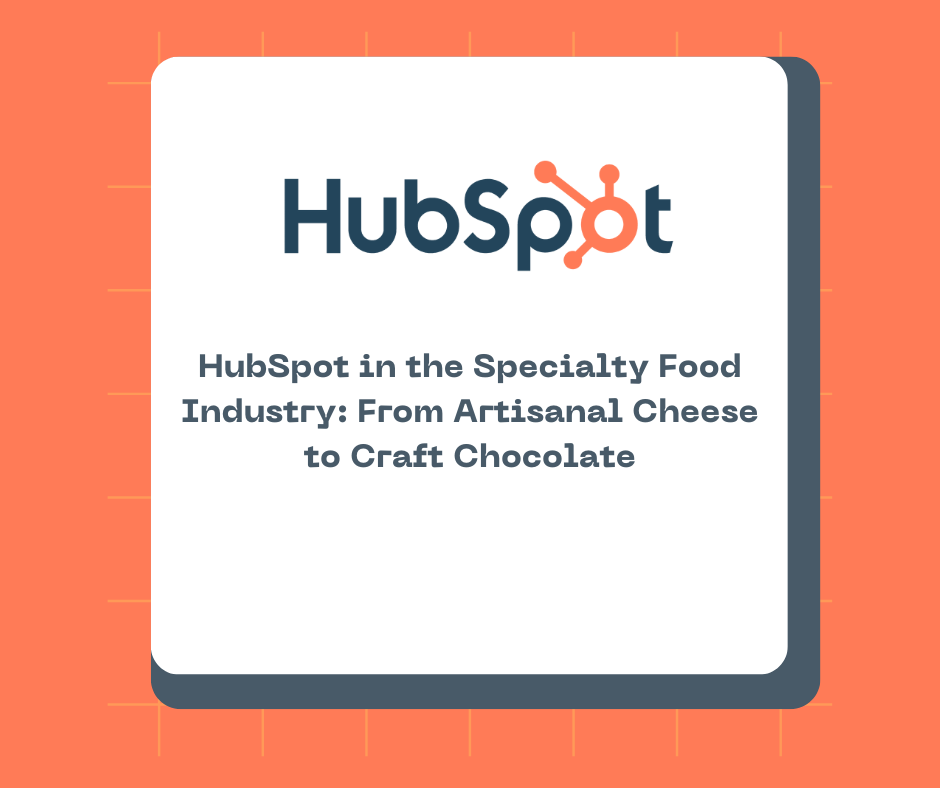In the world of specialty foods, from artisanal cheeses to craft chocolates, the connection between producer and consumer is key. Customers in this market value quality, craftsmanship, and the story behind their favorite indulgences. However, marketers face unique challenges in reaching these discerning buyers and converting their interest into sales. HubSpot, a leader in inbound marketing, sales, and customer service software, offers a suite of tools that can revolutionize how specialty food businesses engage their audience. This article explores how HubSpot can be effectively utilized to elevate marketing strategies within the specialty food industry.
Understanding the Specialty Food Market
The specialty food sector is driven by consumers who seek exceptional taste experiences and have a keen interest in the origins and production processes of their food. These consumers often prioritize organic, sustainable, and ethically produced goods. For marketers, the challenge lies in effectively communicating these values while also highlighting the unique qualities of their products.
Challenges in Specialty Food Marketing
- Educating Consumers: Providing detailed product information and educating consumers about what makes these products special.
- Building Brand Loyalty: Developing strong customer relationships that encourage repeat business.
- Segmentation and Personalization: Effectively targeting diverse consumer groups and personalizing marketing messages.
- Managing Omnichannel Marketing: Coordinating marketing efforts across multiple channels, including online platforms, physical stores, and events.
Leveraging HubSpot for Marketing Specialty Foods
HubSpot provides an integrated platform to address these challenges through advanced CRM capabilities, marketing automation, social media tools, and powerful analytics.
1. Streamlined Customer Relationship Management
At the core of effective specialty food marketing is a deep understanding of your customer base. HubSpot’s CRM system allows businesses to maintain detailed profiles of customer preferences and interactions, which is invaluable for building personalized relationships.
- Strategy Example: Use HubSpot’s CRM to track customer purchase histories and preferences for specific types of products, such as vegan chocolates or locally sourced cheeses. This information can be used to tailor email marketing campaigns that suggest new products they might like or offer special promotions on their favorites.
2. Targeted Email Marketing Campaigns
Email marketing is a crucial tool for educating consumers and keeping them engaged with your brand. HubSpot’s email marketing tools enable the creation of personalized, content-rich emails that resonate with the target audience.
- Strategy Example: Develop segmented email lists for different consumer interests and send out newsletters that include recipes, product tips, upcoming product releases, and behind-the-scenes stories from your artisans. For example, send an email series on the process of making artisanal cheese to subscribers interested in gourmet dairy products.
3. Content Marketing with HubSpot’s CMS
Content marketing helps in building a brand story and educating potential customers about your products. HubSpot’s Content Management System (CMS) can facilitate the creation and management of engaging content that drives traffic and conversions.
- Strategy Example: Create a blog that features posts about the origins of your ingredients, profiles on your artisans, and detailed guides on enjoying your products (pairing chocolates with wines, cheeses with craft beers, etc.). Use HubSpot’s SEO tools to ensure your content ranks well in search engines, attracting organic traffic.
4. Social Media Integration and Engagement
Social media platforms are essential for visual-based storytelling and direct customer interaction. HubSpot’s social media tools help schedule and analyze content across platforms to maximize engagement.
- Strategy Example: Utilize HubSpot to plan and post content that showcases the unique aspects of your products through high-quality images and videos. Highlight customer reviews, share posts featuring your products in use (e.g., meals, tastings), and run interactive contests that encourage user participation.
5. Utilizing Marketing Automation for Efficient Engagement
Marketing automation can help maintain customer engagement without manual effort for each interaction. HubSpot’s marketing automation tools allow for the setting up of workflows that nurture leads through personalized content and offers.
- Strategy Example: Set up automated email workflows that trigger after a customer makes a purchase or signs up for your newsletter. These emails can provide additional information about the product purchased, cross-sell related items, or invite customers to events like virtual tastings or in-store demos.
6. Analytics and Reporting to Refine Strategies
Continuously monitoring the effectiveness of marketing strategies is crucial for any business. HubSpot provides detailed analytics that can help specialty food companies measure the success of their marketing efforts and pivot as necessary.
- Strategy Example: Regularly review the analytics on email campaign performance, social media engagement, and website traffic. Identify which types of content and which channels are most effective at driving interest and sales, and adjust your marketing strategy accordingly to optimize ROI.
Best Practices for Using HubSpot in Specialty Food Marketing
- Focus on Quality Content: Ensure all content, from emails to social media posts, is high-quality and reflects the artisanal nature of your products.
- Engage Regularly and Personally: Use the tools available through HubSpot to engage with customers regularly and in a manner that feels personal and genuine.
- Leverage Customer Feedback: Encourage and collect customer feedback through surveys and reviews managed through HubSpot. Use this feedback to improve products and customer service.
- Integrate Across Channels: Ensure your marketing strategy is cohesive across all platforms. Use HubSpot to manage these efforts from a central hub to maintain a unified brand voice and message.
Conclusion
For businesses in the specialty food industry, HubSpot offers a comprehensive toolkit that can transform the way they connect with consumers. By leveraging HubSpot’s CRM, email marketing, content management, social media integration, automation tools, and analytics, specialty food marketers can enhance their visibility, engage more deeply with their audience, and drive meaningful growth. With strategic implementation, these tools can help turn a niche food product into a widely recognized and sought-after brand.
Schedule your training session here and comment “Need Training” on the request form.

.png?width=1200&length=1200&name=Burger%20Ads%20(Facebook%20Post).png)
Comments